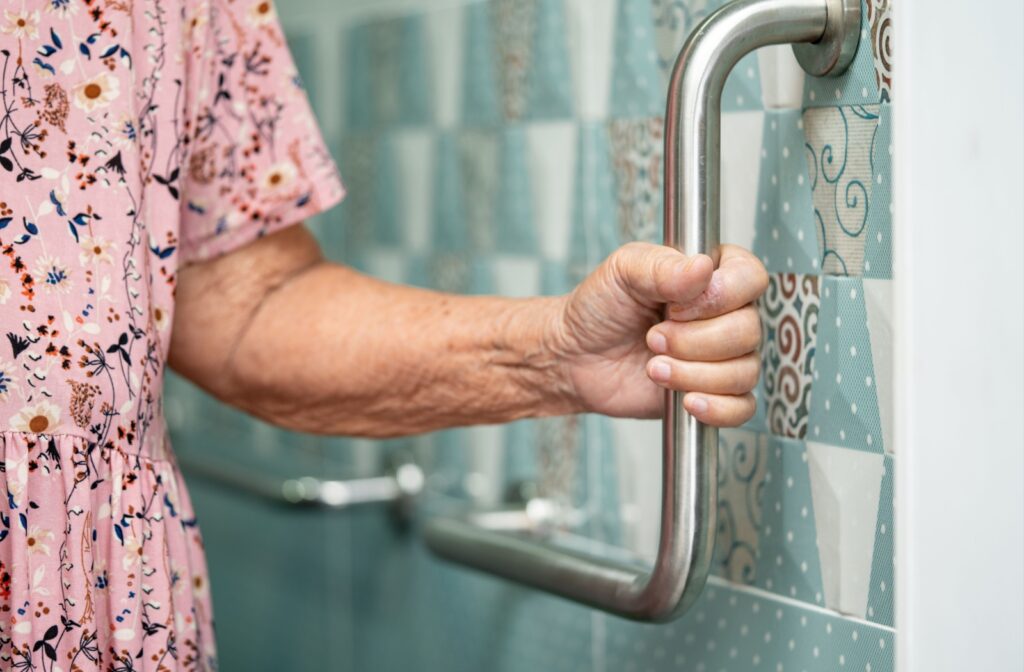When your parent starts refusing to shower or bathe, it can feel frustrating and concerning. You might wonder if they’re becoming stubborn or if something more profound is happening.
The truth is, bathing resistance in aging adults usually signals underlying fears, physical challenges, or cognitive changes that make personal care feel overwhelming or frightening. Understanding these root causes helps you approach the situation with empathy and find solutions that work for everyone.
Key Takeaways
- Bathing resistance often stems from fear, depression, cognitive changes, or a desire for independence.
- Look for warning signs, such as body odor, soiled clothing, or changes in appearance.
- Approach conversations with compassion and focus on understanding their concerns.
- Simple bathroom modifications and routine changes can make bathing safer and more comfortable.
- Professional care options, such as assisted living or memory care, provide support when needed.
Why Do Aging Parents Resist Bathing & Personal Hygiene?
Fear of Falling in the Bathroom
Slippery surfaces and wet floors can make the bathroom feel like a danger zone for your parent. Balance issues, muscle weakness, or a history of falls create genuine safety concerns. When getting in and out of the tub feels risky, avoiding baths becomes a protective response rather than a defiant one.
Depression and Loss of Interest in Self-Care
Depression often shows up as neglecting personal hygiene and grooming. Your parent might feel like there’s no point in staying clean or feel too emotionally drained to manage daily tasks. Social isolation and grief over losses can deepen these feelings and make self-care seem unimportant.
Cognitive Changes and Memory Issues
Memory loss can make your parent forget how long it’s been since their last shower or feel confused about the bathing process. Dementia might cause them to feel scared or disoriented in the bathroom. The routine steps of bathing can become overwhelming when cognitive abilities decline.
Maintaining Independence and Control
Your parent might resist help with bathing because it feels like giving up their independence. Personal care is intimate, and accepting assistance can feel embarrassing or infantilizing. Maintaining control over when and how they bathe might be one of the few choices they think they still have.
What Are the Signs Your Parent Needs Help With Personal Care?
When Hygiene Changes Signal Deeper Issues
Watch for these warning signs that indicate your parent needs support:
- Strong body odor or unwashed hair
- Wearing the same clothes for days
- Visible dirt or stains on clothing
- Neglecting dental care or grooming
- Social withdrawal or avoiding visitors
Health Risks of Poor Personal Hygiene
Poor hygiene can lead to skin infections, urinary tract infections, and dental problems. Unwashed clothing and bedding create breeding grounds for bacteria. Social isolation often increases when people feel embarrassed about their appearance, creating a cycle that affects mental health and overall well-being.
How Can I Discuss Hygiene Concerns with My Parent?
Starting the Conversation With Compassion
Choose a private moment when your parent feels relaxed and comfortable. Express your concerns from a place of love rather than criticism. You might say, “I’ve noticed you seem to be having trouble with your morning routine, and I want to help make things easier for you.”
Avoiding Power Struggles Over Personal Care
Don’t demand immediate changes or use shame as motivation. Instead, focus on partnership and problem-solving together. Acknowledge their feelings and validate their concerns while gently exploring solutions that preserve their dignity.
Asking the Right Questions to Understand Their Concerns
Listen to understand what’s really happening. Ask open-ended questions like “What makes bathing feel difficult right now?” or “How can we make this easier for you?” Their answers will guide you toward the most helpful solutions for their specific situation.
What Are Practical Solutions to Make Bathing Easier and Safer?

Installing Safety Features in the Bathroom
Simple modifications can transform the bathroom into a safer space. Consider adding grab bars near the toilet and shower, non-slip mats on the floor, and a shower chair or bench for added support. A handheld showerhead gives your parent more control during bathing.
Creating a Comfortable Bathing Routine
Work together to establish a routine that feels manageable and sustainable. This might mean bathing at a specific time of day when your parent has more energy, warming the bathroom beforehand, or playing calming music. Small comforts can make a big difference in how they experience personal care.
Using Professional Caregivers for Personal Care
Sometimes, accepting help from a trained caregiver feels less threatening than relying on family assistance. Professional caregivers know how to maintain dignity while providing personal care support. Assisted living services offer this type of gentle, respectful assistance as part of daily care.
Alternative Hygiene Options When Full Baths Aren’t Possible
On difficult days, focus on the basics. No-rinse shampoos, body wipes, and dry shampoo can help maintain cleanliness between full baths. Breaking personal care into smaller, manageable steps often feels less overwhelming than trying to tackle everything at once.
When Should My Family Consider Senior Living Communities?
How Assisted Living Can Help With Daily Care
In assisted living, caring staff members provide gentle reminders and assistance with personal care tasks. Your loved one maintains their independence while receiving the support they need to stay clean and comfortable. Professional caregivers understand how to approach personal care with dignity and respect.
Memory Care Support for Parents With Dementia
When cognitive changes make bathing confusing or frightening, specialized memory care provides the extra support your parent needs. Trained staff members know how to guide someone through personal care routines without causing distress or confusion.
Making the Transition to Professional Care
The transition to professional care doesn’t mean your parent is giving up their independence. Communities like Peregrine Senior Living focus on supporting each person’s ability to live comfortably while providing assistance where it’s needed.
Moving Forward With Understanding & Support
At Peregrine Senior Living at Salisbury, we understand how challenging these conversations and decisions can be for families. Our compassionate team knows how to provide personal care assistance while honoring each person’s dignity and independence.
Contact us today to schedule a tour and discover how we create a warm, supportive environment where your loved one can keep clean, healthy, and happy.













Dining at our community is about more than what’s on the plate—it’s about connection, community, and the joy of gathering together.
Our talented culinary team crafts meals that are both delicious and nutritious, offering flavors that comfort and inspire.
From themed dinners to chef demonstrations, each meal becomes an opportunity to savor the moment and celebrate life’s simple pleasures. 🍴
peregrinesalisbury.com/ ... See MoreSee Less
0 CommentsComment on Facebook
Be a cactus in a world of delicate flowers
Assisted Living Residents creating colorful plants ... See MoreSee Less
0 CommentsComment on Facebook
Birthday bash with Shortcut Sunny 🎂🎉 ... See MoreSee Less
1 CommentsComment on Facebook
Collecting memories, one shell at a time.
Assisted Living Residents made their photo frames ... See MoreSee Less
1 CommentsComment on Facebook
Today we celebrate the caregivers—those whose quiet strength and unwavering compassion bring comfort to so many.
We see the difference caregivers make every day: holding a hand, sharing a smile, or offering reassurance when it’s needed most. 💕
Your dedication reminds us that true care goes beyond tasks—it’s an act of love, patience, and humanity.
Thank you for all you do to make the world a more compassionate place.
peregrinesalisbury.com/ ... See MoreSee Less
0 CommentsComment on Facebook
Mardi Gras Celebration ... See MoreSee Less
0 CommentsComment on Facebook
“Laissez les bons temp rouler!”
(Let the good times roll!)
Memory Care residents decorate Mardi Gras masks to celebrate the holiday. ... See MoreSee Less
1 CommentsComment on Facebook